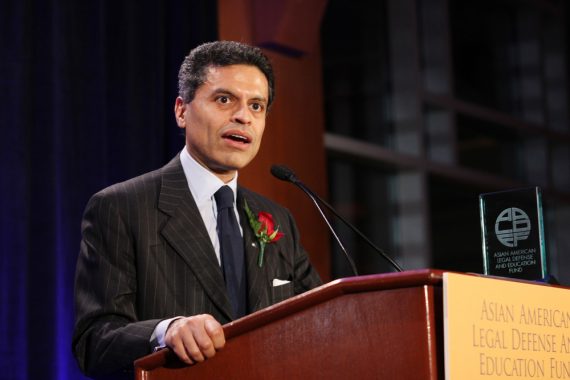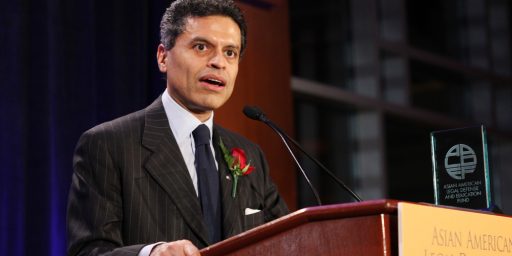Fareed Zakaria Reads (And Copies From) The New Yorker So You Don’t Have To
CNN's Fareed Zakaria looks to be caught in a bit of a plagiarism scandal.
Fareed Zarkaria, CNN Sunday host and columnist for Time, has a column in the most recent issue of the magazine about gun control. Unfortunately for Zakaria, his column bears a striking resemblance to a New Yorker article written in April by Jill Lepore. The Atlantic’s Alexander Abad-Santos has the details:
We’d emphasize the similarities, but the gists of both paragraphs make the same point, have the same turns, and yeah, this doesn’t look great for an award-winning big name journalist/columnist like Zakaria.The Atlantic‘s Jeffrey Goldberg pointed out that Zakaria in 2009 had lifted quotes from his interviews without attribution–today’s piece runs without any mention to Lepore. So what gives and just how bad is this? Well, going by The New Yorker‘s Lehrer Plagiarism Scale, we’d say it ranks worse than Jonah Lehrer borrowing from himself (a misdemeanor according to editor David Remnick said at the time) but not as bad as Lehrer making up quotes (which eventually spelled his resignation from this magazine). And this offense seems a lot more serious than recycling a commencement speech, which Zakaria did this year at Duke and Harvard.
In a long update to the post, Santos points out numerous other similarities between Zakaria’s column and Lepore’s article and, in case you’re wondering, no Zakaria does not cite, link to, or provide credit to Lepore anywhere in his column.
So far, neither Zakaria nor Time have commented on the matter, nor has CNN, but I’m sure we can expect to hear something about this soon. In the meantime, there’s much that can be said about this matter but, given the fact that this is not new, that other journalists have been caught doing either plagiarizing or making things up out of whole cloth. Just this week, in fact, The New Yorker ‘s Jonah Lehrer resigned after it was discovered that many of the quotes in the biography he wrote about Bob Dylan were completely made up.
I’m not sure what the consequences for Zakaria will be, but the question I have to ask is a simple one. In any age where everything is digitized, where the stories of men like Jayson Blair and Lehrer are well known, why would someone even risk doing something like this and, potentially completely destroying their credibility?
Dan Amira comments:
As you can see, Zakaria does not lift Lepore’s passage word for word. He tweaks the language ever so slightly — enough, in his mind, perhaps, that crediting Lepore in any way was no longer required. It’s shady. If you’re going to rewrite an entire passage, with only the most imperceptible and inconsequential alterations, you might as well just quote the passage and source it to the person who wrote it. Otherwise, you are taking credit for work that isn’t yours. This is generally frowned upon.
(…)
The best-case explanation is that Zakaria’s transgression was the result of sloppiness, as opposed to intentional deceptiveness. But this isn’t even the first time that Zakaria has been accused of taking ownership of another writer’s work. We hope those are the only examples and that there’s no larger pattern of plagiarism here. But, if there is, the Internet will find it, eventually, once it has a reason to look. Ask Jonah Lehrer.
Indeed, it will, and I’m sure there already people out there Googling away. Zakaria will supposedly be releasing a statement of some kind today. Hopefully, he won’t copy it from someplace else.
Update: The Atlantic’s Santos, posts an update on his post with this statement from Zakaria:
“Media reporters have pointed out that paragraphs in my Time column this week bear close similarities to paragraphs in Jill Lepore’s essay in the April 22nd issue of The New Yorker. They are right. I made a terrible mistake. It is a serious lapse and one that is entirely my fault. I apologize unreservedly to her, to my editors at Time, and to my readers.”
No word from Time as of yet.
Update # 2: Both Time and CNN have suspended Zakaria. The Time suspension is for a month (at least?) and the CNN suspension is “indefinite.”







The last line is classic. Two thumbs up!
@Moderate Mom:
Finally, something we can agree on. 😉
Get used to butter, FZ, because you’re going to be toast.
Oddly, plagiarism of this sort doesn’t seem to have permanently harmed Doris Kearns Godwin and a couple of other prominent authors. It’s especially weird in this instance, because he basically cribbed her synopsis of a book.
Welcome to the internet world, where content is so easily available for “boiler plate” and it is so easy to not attribute the content to it’s rightful author or source.
James, 3 of my college friends are now college professors, all at a graduate level, and one of the first things each of them does is to inform their graduate students that they must … must… footnote and source the content of their research papers. If they have any doubt, footnote it. I understand that college professors now have other tools to detect plaigerism.
So, Time has suspended FZ for a month, “pending further review” and CNN has suspended him indefinitely “while this matter is under review.” I presume both of those are code for “we are waiting to see if other such skeletons pop out of the closet as all of his work is now scrutinized by thousands of people on the internet.”
If Zakaria is not fired plagiarism he should be fired for stupidity. Today’s technology makes it as easy to detect plagiarism as it does to commit plagiarism.
@al-Ameda:
They do. It’s a computer program that’s used in high schools now too, and I’m sure there is more than on program that does this. Both of my kids always had to turn papers in online in college (my son had to in high school as well) and the papers are analyzed for plagiarism by some program the instructor runs them through. Not sure how it works, but from what the kids tell me, it does.
@Moderate Mom: THere are software tools but probably the most used methods involve a gut instinct and google.
It’s been alluded to above but I think that Time, as well as other content providers, are beating a dead horse. This is the age of sampling. Creativity in music and practically everything else consists of taking a snippet from here and a snippet from there and assembling it into a collage.
There’s a huge, unbridgeable gulf between the 1% and the 99% on this. They do it but they don’t want you to do it.
@Dave Schuler: Sampling is fine. Hell, I do it all the time. But there’s no excuse in a digital world, especially, for not citing sources. In the old days, it was really clunky to do so in an 800-word column. Now, all that’s needed is a hyperlink.
My point is that citation is an “inside baseball” view which will only grow more incoherent as time passes. Consider, for example, the large number of times in which bloggers get absolutely no credit from old media for the stories they break. It’s not simple hypocrisy. It’s incoherence.
@al-Ameda:
I tell my students exactly the same thing.
And yes: there are tools, the most prominent being Turnitin,com, that are incredibly effective at helping to identify plagiarism. Even both that was available, and it is pretty standard these days, the Googling of suspicious sentences did wonders.
@Steven L. Taylor: I had a grad student (grandfathered into my program from an earlier iteration) who turned in several terrible, barely readable, ignorant papers. Then on his thesis paper he showed not only a real understanding of film history, but a solid grasp on the basics of grammar and spelling.
I spent about two seconds marvelling at how much he had improved, then started pasting his sentences into Google, and found every one of them on film history websites. Word for word.
I don’t know how you can survive into your mid-twenties when you’re that stupid…
@wr: Yup. I have two standard lines that I tend to say to classes on this subject:
1. “If I am reading a paper that barely follows the rules of basic grammar and then it all of a sudden morphs into prose befitting a Harvard Ph.D., I will get immediately suspicious.”
and, more directly:
2. “If you can find it on the internet, I can find it on the internet.”